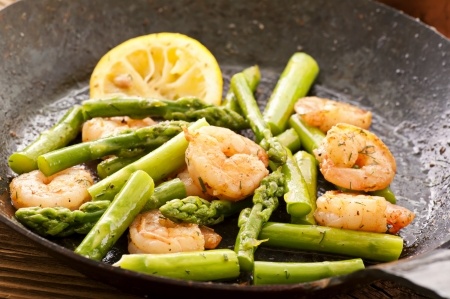Wondering about the health benefits of shrimp? If you’re a fan of shrimp, you’ve got plenty of company. The average American eats about 4 pounds of the stuff every year. That’s more than any other seafood.
Ranging in size from small to jumbo, shrimp are typically 1 to 3 inches long. The crustaceans come from warm and cold waters around the world. The pink cold-water ones come cooked and peeled. Warm-water shrimp, in white, brown or pink, are available cooked or raw.
Around 90% of the shrimp you eat come from a farm. They’re raised in ponds on a controlled diet. Fishermen catch wild shrimp in coastal waters. These shrimp make up about 10% of what we eat in the U.S.
Nutrients per Serving
Shrimp are mostly made up of protein and water. On average, 100 grams of cooked shrimp has:
• Calories: 99
• Fat: 0.3 grams
• Carbs: 0.2 grams
• Cholesterol: 189 milligrams
• Sodium: 111 milligrams
• Protein: 24 grams
Other vitamins and minerals include:
• Phosphorus
• Copper
• Zinc
• Magnesium
• Calcium
• Potassium
• Iron
• Manganese
Health Benefits of Shrimp
There are many health benefits of shrimp. Because they’re low in carbs and calories and packed with nutrients, shrimp are an ideal choice if you’re trying to shed some pounds.
But be careful how you cook it. If you prepare shrimp in a deep fryer or add it to a creamy sauce, you end up tipping the scale in the wrong direction.
The antioxidants in shrimp are good for your health. These substances can protect your cells against damage. Studies suggest that the antioxidant astaxanthin helps prevent wrinkles and lessens sun damage.
Shrimp also has plenty of selenium. Some studies suggest this mineral prevents certain types of cancer, but there’s not enough research to know how well it works.
Are There Any Risks?
One potential concern is the high amount of cholesterol in shrimp. Experts once held that eating too many foods high in cholesterol was bad for the heart. But modern research shows it’s the saturated fat in your diet that raises cholesterol levels in your body, not necessarily the amount of cholesterol in your food. Still, if you’re wary of the stuff, moderation is key.
Shellfish, including shrimp, is also the cause of a common and sometimes severe food allergy. More than half the people who are allergic to shellfish have their first reaction as an adult.
Avoid shrimp that has an unusual smell to it, especially if it smells like ammonia, which is a sign of bacterial growth.
How to Prepare Shrimp
Shrimp is a versatile food that you can cook in several ways. Healthier methods include:
• Boiling
• Steaming
• Grilling
• Broiling
• Sautéing
Unless you live near the coast, shrimp at your local grocery likely aren’t fresh. They’ll be frozen or previously frozen and thawed. Some food experts will tell you it’s OK to buy thawed shrimp if you plan on cooking them immediately. Just don’t refreeze them. Others argue that thawed shrimp may have been frozen and thawed more than once, which affects both texture and flavor.
Methods vary, but to prepare your shrimp, first soak them in cold water before you clean them. Some cooks use salt water. To remove the shell, pull the legs off first and use your thumbs to separate the shell from the body. You can pull the head away as the shell comes off.
You can remove the tail next, but that’s optional. Also, up to you is “deveining” the shrimp. The “vein” is the black digestive tract that runs along the back. Simply use a paring knife to separate the flesh in a line and dig it out.
When you’re done cooking, rinse the shrimp and pat them dry. Make sure you cook the shrimp completely. You’ll know it’s ready when they curl up — almost in the shape of the letter “C” — and the gray turns pink.
Click here to read more about the health benefits of shrimp.






